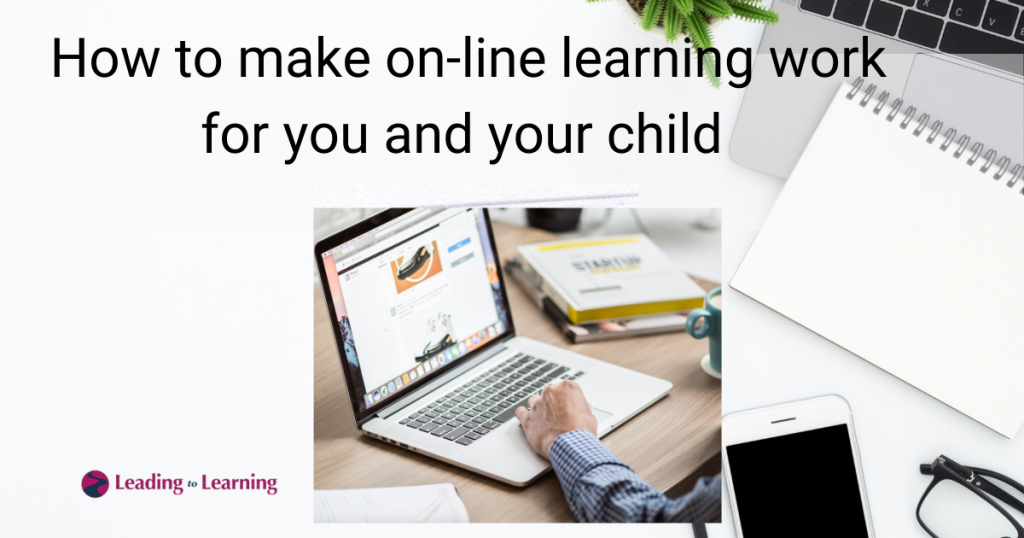Parents are juggling home life, work, and helping one or more child continue their education. Talk about increased stress! And this stress is increased when your child finds on line learning difficult.
Students are having to move from classroom learning to learning on line. For some students this is not a problem, maybe even a preferred way of learning, but for others the move can make learning much more difficult.
On-line learning requires skills that children may not use in the classroom. If your child does not have, or does not use, these skills on-line learning is going to be hard work for both of you. When you know what skills your child needs you can help make the situation better for everyone.
I know the skills children need to be successful learners in school but these need to be adapted for learning on line. Here are the ones students need to be successful on-line learners.
- Help your child develop Self-discipline
I think this is the most important skill students need. While learning online your child does not have a teacher looking over his or her shoulder or even setting deadlines. Your child has relative freedom to choose when and where the work will get done.
(I have just been sent a photo of my granddaughter doing on-line schoolwork while drinking coffee and lounging on her bed!)
Life holds many distractions, especially with social media and video games readily available on the computer, and your child has to learn how to ignore them and settle into schoolwork.
You can help your child practice self-discipline by setting up a space and a time for learning where distractions are few – no pets, no TV, no snacks, same place each day, no phone calls. Don’t expect your child to avoid all distraction. Limit the time your child has to focus on work. Use a timer and set it for the amount of time you think the work will take to get finished. At the end of that time allow your child to be distracted before settling down to the next piece of work.
The younger the child the shorter time he or she should be expected to focus on schoolwork.
- Understand your child’s Learning preferences
Some children are Self Smart learners and learn best when they are left to work things out on their own, only asking for help when they really need it. Others are People Smart learners. This type of learner needs to interact with people as they learn. He or she needs to bounce ideas off others before making a decision about what to do.
On-line learning works well for Self Smart students, not so well for People Smart learners. With luck your People Smart child will have access to a great Learning Management system that allows him or her to interact with teachers and other students. If this is not the case you have to be around to ask questions, make comments (always positive ones!) and keep your child involved in learning. I realize this is time consuming but it is the best way to keep your child involved in on line learning.
Social media, if it is work related, is also useful for this type of learner.
By the way, do not nag your child about getting their work done. That is neither helpful nor fun!
- Help your child access suitable materials
Children need to know what to learn as well as how to learn. Schools use a variety of ways to help children with the ‘what’ of learning. I know that many parents would like a copy of any text books being used in school so they could help their child review their work. These textbooks can cost over $50 each so schools are reluctant to let them out of their sight!
On line learning is a great opportunity for a child to use the Internet to explore content for things like project work and creative exploits. However, searching for information on the Internet can be especially dangerous for young students. You might want to be around while your child is searching and be ready to offer advice.
Teachers may put worksheets and learning activities on line but many teachers have not been trained in the best ways of doing this.
A good resource for you to explore is the Open school https://www.openschool.bc.ca/k12/
You can freely download materials relevant to several school curricula to supplement what the school is sending your child.
- Provide positive feedback
An important part of the learning process is feedback. Students need to understand whether they are doing the right thing and whether what they are doing is up to standard. This can happen easily in a regular classroom but is more difficult to achieve on-line. Your child may be lucky and have a teacher who takes the time to contact him or her and talk about their work but this is time consuming and such communication may be in short supply.
You can help. You can provide feedback that encourages good learning. You may not be able, nor should you, comment on the quality of work your child has produced but you are more able than ever to comment on how your child has done the work. Praise the process not the product. Praise your child for how the work was completed. By doing this you encourage good work habits which inevitably leads to better work.
- Check computer skills
It may seem superfluous to talk about your child’s needs to develop computer skills as he or she may know more about how to use a computer than you! However, some children may be struggling with new programs or learning management software and need support to make it work for them. You too may need to understand how your child’s learning management works so you can contact the teacher or provide answers to your child’s questions.
Another stress, I know, and possibly one that you hadn’t thought about.
Letting your child teach you how to use the software can be both entertaining and fruitful! The best way to learn something is to teach someone else!
- Spread optimism
We are only beginning to come to terms with the ways our lives are changing. No one feels secure about the future. That is why optimism is so important right now. Your child needs to feel that he or she is going to have possibilities in life and the ability to create and hold down the job of their choice.
Why put effort into learning when there is nothing to learn for? Why be self-disciplined and persistent (a skill I didn’t mention but which students need right now) if the rewards are going to be minimal?
You both need to acknowledge that schools are changing, that getting an education may be more difficult than previously, or, if not more difficult at least different.
But the goals are still there. A good education is the key to a life of opportunity and fulfilment. It may be hard to keep this message at the forefront of your thoughts when you and your child are unsure about the future but without optimism your child has no reason to want to learn. Please make sure your child knows that although the future may look very different from today now is the time to develop the skills that will let him or her become lifelong learners.
How are you making on-line learning work for your child? Please share your comments.








1 thought on “How to make on-line learning work for your child”
Practice, learning and thinking again about the steps are great idea for mathematic practice. Thanks for this informative article on this, and subscribed your blog..